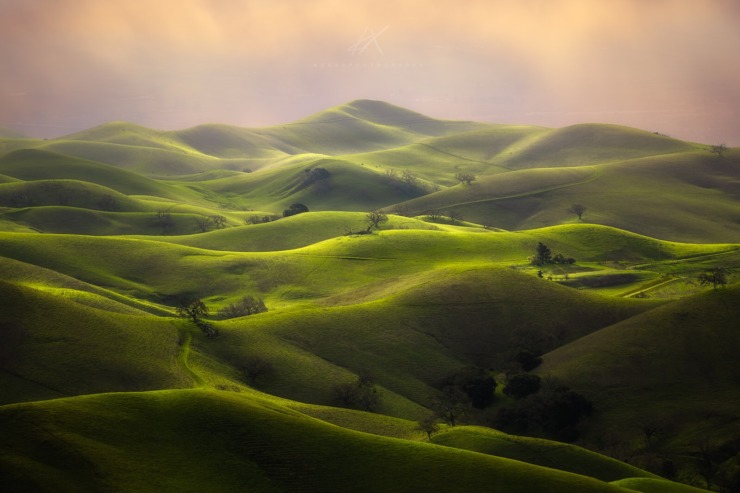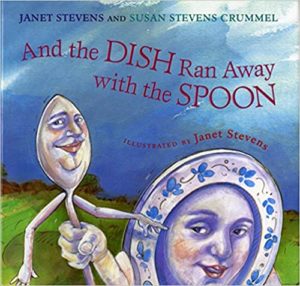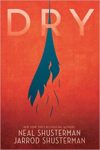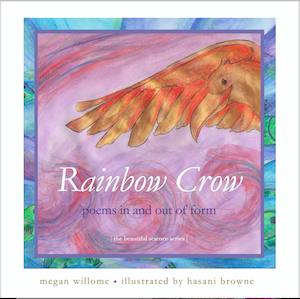
But sometimes we don’t share them. Maybe they sound wrong to our modern ears. Maybe we happened to see what the rhyme may have meant to the original hearers and cringe. Maybe our teachers didn’t cover them, and our parents didn’t read them.
My friends, if this is true for you, all is not well in your reading world. You need nursery rhymes. Why? For the endless opportunity to get jokes, which are often based on shared experiences.
If the little ones in your life like jokes, and if they have a solid grounding in nursery rhymes, children’s poems, and fairy tales, then they will get a lot of laughs out of Janet Stevens and Susan Stevens-Crummel’s And the Dish Ran Away with the Spoon.
The story begins with “Hey, diddle diddle,” then asks, What if “the dish ran away with the spoon” and didn’t come back? “EVERYBODY UP!” says the Cat with the fiddle. It’s time for a joke-filled adventure.
The journey will take Cat, Dog, and Cow to visit other nursery rhyme folks along with fairy tale friends. They’ll visit Little Boy Blue, Little Miss Muffet’s spider, the Wolf who has taken up residence in the Three Pigs’ House, Jack’s beanstalk, and a Jack of all trades conveniently located near Humpty Dumpty’s Wall. They’ll hear about Bo Peep, Three Men in a Tub, the Three Bears who don’t like people dropping by unannounced, and they will encounter an actual Fork in the road who mentions the four and twenty blackbirds who flew by. On my third read-through, I found nods to Lewis Carroll’s Through the Looking Glass and a reference to Eugene Field’s Wynken, Blynken, and Nod.
I learned about this book from Miss Vivian Rutherford, a children’s librarian who recently retired from the Waco-McLennan County Library. She listed five picture books that generations of kids have enjoyed her reading aloud, and this was one of them.
I think one reason the book was a favorite is that many of Stevens’ illustrations are jokey. The little Dog who “laughed to see such sport” wears a tutu and a birthday hat. The Three Blind Mice, make their way with tiny walking sticks. In the Wolf’s house hangs a sheep suit.
Every time the troup moves from one location to another, the illustration shows a map with a red line, indicating the route, and surrounding each map is a mini-rhyme.
Here’s the rhyme that appears around the map as they venture to the beanstalk:
“With a fee and a fum and a twiddle dee dum,
the cow jumped high in the air.
Over the forest and meadows they flew,
and lickety-split—they were there!”
I can imagine Miss Vivian pausing to ask her listeners what storybook character says, “Fee fi fo fum!” And why do they think this cow can jump so high?
The maps were one of my favorite parts of this book. The authors’ note says the author and illustrator (who are sisters) “have long appreciated the value of a good map. They spent much of their childhood crisscrossing the country with their family as their father, a naval officer, changed duty stations. Reading maps during those long car trips distracted them from asked the question dreaded by parents everywhere: ‘Are we there yet?’”
If you have a map, you can figure out the answer. If you know the rhyme and the old, old story, you can smile with recognition when it’s turned upside-down. Dog says:
“Why do we need dish and spoon anyway?
“We just do,” said Cat. “It’s the why our rhyme goes. I fiddle, she jumps, you laugh, they run, and then they come back so we can do it again the next time. Without Dish and Spoon, there’s no rhyme, no more ‘diddle diddle.’ It’s over.”
“Why don’t we just change their part?” Dog growled.
And that’s exactly what happens in the end, complete with a big red X through the original text. Because this story ends with one last joke.
Next Month’s Selection
Earth Day is next month, and we celebrate all month long as Poetic Earth Month. For our next Children’s Book Club, Friday April 9, we’ll read a YA thriller about climate change — Dry, by Neal Shusterman and his son Jarrod Shusterman.
Photo by Ken Xu, Creative Commons, via Flickr. Post by Megan Willome.
Browse more Children’s Book Clubs
“Megan Willome has captured the essence of crow in this delightful children’s collection. Not only do the poems introduce the reader to the unusual habits and nature of this bird, but also different forms of poetry as well.”
—Michelle Ortega, poet and children’s speech pathologist
- Perspective: The Two, The Only: Calvin and Hobbes - December 16, 2022
- Children’s Book Club: A Very Haunted Christmas - December 9, 2022
- By Heart: ‘The night is darkening round me’ by Emily Brontë - December 2, 2022



Leave a Reply